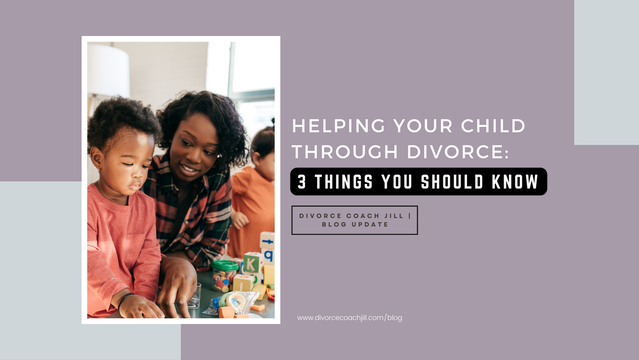|
The effects of divorce can be devastating for children. Children of divorce are more likely to struggle academically, mentally, and in their relationships. They frequently have feelings of betrayal, anger, and sadness. While some children can overcome these obstacles, others may struggle well into adulthood.
The good news is that there are several things parents can do to help their children through the process so that they are protected from the negative consequences of divorce. Here are three crucial things to keep in mind. Explain What’s Happening in Your Family in Age-Appropriate Terms and Listen to What Your Children Have to Say Telling your children that you’re getting divorced is one of the most difficult conversations you can have. It’s important to tell your children together with their other parent about the divorce. Create a script together so that you both agree on what to say. Avoid blaming either parent and instead emphasize that both parents still love them very much. You can help your children understand and cope by explaining that sometimes couples grow apart and sometimes they should live apart. Let your children know how their lives will change. Children are primarily concerned about themselves and focusing on how their lives will be impacted is helpful. Let them know how their lives will be the same and what may change. Encourage your children to ask questions and provide answers to their questions. Only provide details that are absolutely necessary for them to know. Younger children don’t need to know much about why the marriage is ending. Tell them simple, concrete terms - for example, which parent will move out, where they’ll live, what school they’re going to, etc. Older children may want to know more details about the divorce but it’s not necessary to go into too much detail. You can say that you tried to work to make things better. You can reassure them that you both will continue to work together to be there for them. It’s important to allow your children time to process their feelings. Don’t push them to talk. Instead let them know that you’re available to them any time they feel like talking. Check in with them in the next few hours after you tell them and continuously over the next days, weeks and months. Children react differently, with some children having emotional reactions at different times. The relationship between you and your spouse while you’re going through divorce has an impact on your children. Even if you and your spouse get along in front of your children during your divorce, your kids can still sense if there's tension. They may become anxious themselves or even start to act out. It’s important to maintain a consistent routine, communicate openly with your kids, and to be understanding of their feelings. It's also important to avoid putting your kids in the middle of any arguments. This will help your kids feel more secure during this time of change. Make Co-Parenting A Success Co-parenting is when both parents share the responsibility of raising their children even though they’re separated or they don't live together. Children have to deal with their parents separately which is very different from what happens in an intact family. They’ll be living in two different homes and having two different sets of rules. They may feel different from their friends and may be ashamed of being in a divorced family. Parents must work together and focus on their children. Children require patience, love, and support from both of their parents. Parents need to put their own feelings aside and communicate with each other about the children’s schedule, how the children are doing emotionally, and how they can work together to support their children through this. There are steps you can take to help protect your child from feeling caught in the middle of arguments.
Think of your children’s other parent as a colleague or coworker who you need to work with for the good of your child. Don’t discuss past emotional issues. Focus on the present and future in your discussions in a non-emotional manner. Working With A Therapist Can Help Children of divorce can benefit greatly from seeing a therapist. In individual therapy, they're more likely to feel safe expressing their authentic selves and discussing the hurtful feelings they may have towards their parents. They may also feel more comfortable discussing complex topics, such as their fears and anxieties, with a therapist than with their parents. Furthermore, a therapist can provide children with tools and resources to help them cope with the challenges of divorce. Final Words Divorce is never easy, but with the right tools and support, you can help your child through it. Your child's emotions are valid. No matter what your child may say, they are going through a lot of change and upheaval during a divorce. It's important to validate their feelings and let them know it's okay to feel the way they do. They need your support now more than ever. We hope these tips have given you a good starting place as you begin to navigate this difficult time. When you have children and get divorced, the final agreement must include a parenting plan to clarify what will happen after the divorce regarding the care of the children. A parenting plan outlines the parenting schedule - when each parent will see the children and the logistics of how that will happen. It also covers other relevant issues like how decisions should be made about medical situations, the children’s education and religious affiliation.
Everything that’s put into the agreement is part of a legal document, the Marital Settlement Agreement or the Separation Agreement, that’s filed with the court. Parents must follow that agreement and can be brought back to court if they don’t. A child-centered parenting plan is one where you put your children and their wellbeing first. There are many things that get in the way of putting children first like work schedules and significant others. However, when you center the plan around the needs of the children and what’s best for them, it will help create a structure for them to grow into emotionally healthy adults. Here are some key tips to keep your parenting plan child-centered:
Does every communication with your ex end in you feeling frustrated and emotional? Then your ex is probably a high conflict person. Divorce is hard enough when both parties are reasonable. Throw a high-conflict ex into the mix and it can feel unbearable. Communicating peacefully with a high-conflict ex may seem impossible, but there are things you can do to communicate effectively and navigate this process with less stress.
Here are tips to keep in mind when communicating with a high-conflict ex:
You can do this! Your children are worth the effort. If you can use these tips successfully, conflict between you and your ex will decrease and you and your children will benefit. Parenting is difficult when you have a good, strong marriage. When going through divorce, parenting has additional complications. In order to co-parent effectively, you need to have mutual respect, strong communication skills and a willingness to compromise and work together for the good of your children. It's extremely difficult to have all of the skills necessary to co-parent effectively when you're angry at one another and are in the middle of divorce negotiations.
After a marriage ends, there can be a lot of built up anger and resentment. Sometimes attorneys can exacerbate those negative feelings as they try to get the best deal for their clients. Meanwhile, if you have children together, you need to interact with each other to discuss parenting schedules and various issues that come up with your children. This can be a recipe for disaster because the children see and feel the tension between their parents. Children can be significantly impacted by this tension. Co-parenting counseling can help. Co-parenting counseling enables parents, with the help of an experienced professional, to work together to build communication and other skills so that they can work together productively. The professional can be very clear about where the boundaries are - what's acceptable and not acceptable for the parents to say, email and text each other. For example, one of my clients thought that it was fine for her to ignore the other parent unless it was an emergency. The other parent would get frustrated and would lash out. Obviously, these are not ideal ways for co-parents to communicate. When I work with co-parents, I encourage them to think of each other as colleagues or coworkers. This enables them to take the emotion out of their communication with each other. I work with them to be respectful of each other, use I messages, listen to each other and come to compromise. Throughout our work, I stress that they're doing this for the good of their children and although it can be difficult, most of my clients are successful. When my clients develop strong co-parenting relationships, they're giving their children the gift of a better future life. Most of the time, when a couple goes through separation and divorce, many angry and resentful feelings occur and it's difficult to see any way to forgive an ex-spouse. However, there are ways to work toward forgiveness. Not only will you benefit from forgiving your ex-spouse, if you have children, they will benefit tremendously.
Forgiveness involves a change of heart and occurs at different times for different people. Circumstances can impact the ability to forgive. If there was an affair, an addiction or some other betrayal, it may take longer to forgive. But there are many reasons to forgive your ex-spouse, including the impact that not forgiving has on you. “Holding onto anger is like drinking poison and expecting the other person to die.” Buddha When you hold onto anger, you’re hurting yourself. You can become stuck in the feelings from the past and it can hold you back from moving on with your life. In addition, it doesn’t feel good to be angry much of the time. It’s not good for people physically to be angry and to hold onto anger. Finally, it can negatively impact children when one or both of their parents are angry at the other. So how can you let go of your anger? The first step is getting it out. You can talk about it to a friend or therapist or write about it in a journal. Find a way to release some of the feelings and that will help you move on. Forgiving yourself is part of the process of forgiveness after divorce. Being angry with your ex may be a way for you not to look at how angry you are at yourself. You may feel guilt, remorse and shame. If you develop empathy for your ex-spouse, you may then feel worthy of empathy and forgiveness also, potentially leading to self-forgiveness. This can lead to a journey of healing and the ability to move on in your life. Although forgiveness may feel like the last thing you want to do, forgiving another and forgiving yourself may be exactly what you need. It will ultimately restore your personal power, reduce negativity and create peace in your life once again. For most parents, telling their children about the decision to divorce is one of the most difficult things that they have to face. It is helpful for both parents to discuss ahead of time what they’re going to share with their children and how they’re going to respond to their children’s questions.
Parents should make several agreements:
If you don’t know where you’ll live, that will create some stress for children. Letting children know a plan for where you’re living, even if it’s just for the near future, will help lower children’s anxiety. If there are issues that the children already know about such as substance abuse, sexual orientation or an affair, it’s better to acknowledge the issue rather than avoid it. If you discuss it with the children, it will enable them to ask questions and feel that they can come to you to talk about things that concern them. Discuss what the schedule will be and anything else that will impact them. Children need to know things like will they be moving, where will each parent live, who they will live with, when will they see each parent, will they stay at the same school and what will happen on their birthday and holidays. Even if you don’t have all of the answers, telling children what’s happening in the near future will help. It’s best for parents to tell their children about the divorce together. It helps children see that their parents are still working together. It provides a sense of safety for children through an unstable time. It also provides an opportunity for children to process the information in a safe environment as both parents are available for questions, reassurance and support. Choose a time where there's no distractions and everyone can be together. If children don’t feel like asking questions or talking about anything, don’t push them. Allow them to have time to process the information. They probably feel a lot of conflicting emotions and may not be able to verbalize their feelings right away. It’s ok to tell children that you’re sad about the divorce and that with time, you will all heal and adjust to the changes in the family. However, try not to show intense emotions like crying for hours or saying, “I don’t know what I’m going to do.” Even though you may be struggling emotionally, you need to deal with your emotions separately from your children. They need to know that you are strong enough to deal with the divorce so that they don’t feel obligated to take care of you. If you need help dealing with all of the emotions and overwhelm of divorce, see a therapist so that you can be there for your children. Many clients seek counseling because they’re having difficulty with combining two families after divorce. They have children who are different ages, have different needs and personalities and they find it overwhelming and stressful. It’s not surprising considering how difficult it is raising children in intact families where there hasn’t been divorce! Despite the difficulties, it is possible to have a happy family even if you have children from two different marriages. Some of the ways to make this situation successful are as follows:
These suggestions will help you develop a closer family when you have partners that have children from previous marriages/relationships. If these techniques don’t work, family counseling with an experienced therapist is an option. However, if you make children and your relationship a priority, respect boundaries and communicate effectively, you’ll be far along the way to having a happy blended family!  Thank you to guest writer, Carla C. Hugo, divorce coach at www.getcoached.com! When a threat comes between you and your child, what's your first response? Often, your hackles are raised and your lips recede baring your teeth, all in an attempt to defend your “cub.”
What happens when the threat to your child is the dissolution of your own marriage? Facing divorce is as frightening as any other threat to your children’s well-being. And in this state of emotion, you function from your “Reptilian Brain.” This is the part of your brain that is activated for survival. Your response to the threat of a broken home for your children may include fight, flight, fear or freezing. It is imperative that you learn techniques to move out of your emotional brain and into your logical-thinking brain. Otherwise, you will be making life long decisions about parenting time, housing, alimony and child-support from the short-term survival decision making part of your brain. Doing so can cause long-term challenges on your life and those precious cubs you long to protect. Get the neutral support you need from a counselor or coach. Learn to feel your emotions, and to refrain from making major life decisions while in an emotional state. A counselor that has experience with divorce or a coach who specializes in divorce are both great resources. Thinking with your logical brain will enable you to protect your “cub” and function better. If you’re functioning better, your children will function better and you will be able to make the right decisions for your family's future. This is the time of year when children are transitioning. Parents are bringing their kids to college, children are starting school and whether it's your first child or your last child, it can be emotional. Throughout a child's life, parents need to let go - when a toddler first learns to walk, the first day of preschool or kindergarten, the first sleepover, the first day of high school - all of these experiences can be difficult for parents to let their children go out on their own. But the more parents can encourage children to be independent, the easier it will be for children to make these transitions.
Children look to us as their role model for many things. If we have a tremendous amount of anxiety or trepidation about our children's independence, children will be able to tell, even if we don't say anything. Talk to a friend or your spouse about your feelings so that you can express your fears and anxieties. If you're still feeling anxious, see a therapist so that you can work through those emotions. It may be bringing up something from your childhood and it may help to have a few sessions with a professional to lessen your anxiousness. During these transitional times, I encourage parents to ask their children questions - ask them about their feelings about going to high school or leaving for college. Ask them what they're excited for and and what they're nervous about. Ask them how they plan to handle any challenges. After hearing all of their feelings, tell them how confident you are that they are going to be able to handle the experience and give specific examples from their past about how they've handled other difficult situations. This conversation is so important because if children feel that their parents have confidence in them, this can give them the confidence they need to move forward. Letting go of our children is difficult but there's nothing more rewarding for a parent than watching your children conquer a new challenge successfully. My son just recently had his wisdom teeth removed and he's recovering nicely physically. But his moods are another story. I've been biting my tongue and trying to stay calm but if I hadn't gone through this with my two older sons I wouldn't be able to be able to put this phase into perspective.
The teen years can be tough - for parents and for teens. Hormones are going wild, teens are trying to figure out who they are and there is so much pressure on them to succeed in school and in life. I wouldn't want to go back to those years for all the money in the world! Each child experiences the teen years differently but they all have some kind of adjustment. I've counseled many parents of teens and teenagers and I've found that the most important thing that a parent can do is to focus on their relationship with the teen. If the relationship is strong, your teen should be ok. While it may be difficult to have a good relationship with your teen, here are some tips to help:
All of this requires a parent to be very patient and to have a lot of self-control. In order to do that, we need to take care of ourselves. As I've mentioned in my previous blog posts, it's extremely important for parents to take care of themselves. So when you find yourself ready to react harshly with your teen, ask yourself, "What can I do right now to take care of myself?" If you can do this successfully, you'll get through the teen years and have independent, appreciative and happy adult children to laugh about it with! |
AuthorJill Barnett Kaufman, MSW, LCSW and Certified Parent Educator is an experienced clinician who helps clients discover new ways to resolve a variety of challenges and bring more happiness and peace into their lives. Archives
November 2023
Categories
All
|
|
If you are in crisis or in need of emergency assistance, please call 911. |
|











 RSS Feed
RSS Feed


